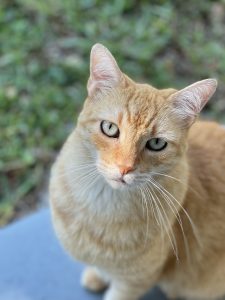
Prevent Hairballs in your cats
Hairballs are a common problem for cats, and they can cause discomfort, vomiting, and even intestinal blockages. As a cat owner, it’s important to take steps to prevent hairballs in your cat. In this blog, we’ll discuss some tips to help reduce the frequency and severity of hairballs in your cat.
Brush your cat regularly:
One of the most effective ways to prevent hairballs is to regularly brush your cat’s coat. Brushing removes loose fur and prevents it from being ingested by your cat while grooming. Aim to brush your cat at least once a week, or more often for long-haired breeds.
Provide your cat with a hairball formula food:
Many pet food companies offer special hairball formula foods that are designed to reduce the likelihood of hairballs in cats. These foods contain added fiber that helps to move hair through the digestive tract, reducing the risk of blockages. Consult with your veterinarian to determine if a hairball formula food is appropriate for your cat.
Increase your cat’s water intake:
Dehydration can make it more difficult for your cat to pass hairballs, so it’s important to ensure that your cat has access to plenty of fresh water. Consider providing your cat with a water fountain or adding wet food to their diet to increase their water intake.
Use hairball remedies:
There are many hairball remedies available on the market, including hairball gels and chews. These products contain ingredients that help to lubricate the digestive tract and facilitate the passage of hairballs. Consult with your veterinarian to determine the best hairball remedy for your cat.
Provide your cat with toys:
Providing your cat with toys to play with can help to reduce their grooming time, and in turn, the amount of hair they ingest. Choose toys that encourage interactive play, such as feather wands. Check out our cat enrichment ideas here.
Keep your cat’s environment clean:
Dust and other airborne particles can stick to your cat’s fur, making it more likely that they will ingest hair while grooming. Regularly clean your cat’s environment, including their litter box, bedding, and play areas, to reduce the amount of airborne particles in the air.
Consider a hairball preventative supplement:
There are many hairball preventative supplements available on the market, such as probiotics and digestive enzymes. These supplements work by promoting healthy digestion and reducing inflammation in the digestive tract. Consult with your veterinarian to determine the best hairball preventative supplement for your cat.
Be aware of your cat’s grooming habits:
Some cats are more prone to grooming and hairball problems than others. Be aware of your cat’s grooming habits and monitor them for signs of excessive grooming, such as bald patches or irritation. If you notice any issues, consult with your veterinarian for further advice.
In conclusion, hairballs can be a nuisance for cats and their owners, but with the right preventative measures, you can help reduce their frequency and severity. Brush your cat regularly, provide them with a hairball formula food, increase their water intake, use hairball remedies, provide them with toys, keep their environment clean, consider a hairball preventative supplement, and be aware of your cat’s grooming habits. By taking these steps, you can help to ensure that your cat stays healthy and happy for years to come.
